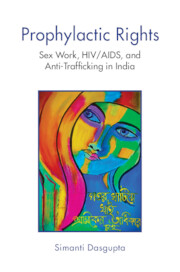Book contents
- Frontmatter
- Dedication
- Contents
- List of Figures
- Acknowledgements
- Introduction: The Karmi (Worker)—From Pesha (Prostitution) to Kaaj (Sex Work)
- 1 The Laboring Gatar: The Body between Suffering and Risk
- 2 Condom-wallis (Condom Sellers) and Condom Narratives
- 3 The Politics of Victimhood: Pachar and Trafficking
- 4 Mela, Immobility, and Imperial Feminism
- Epilogue: Another Virus, Another Lockdown
- Bibliography
- Index
Introduction: The Karmi (Worker)—From Pesha (Prostitution) to Kaaj (Sex Work)
Published online by Cambridge University Press: 31 May 2024
- Frontmatter
- Dedication
- Contents
- List of Figures
- Acknowledgements
- Introduction: The Karmi (Worker)—From Pesha (Prostitution) to Kaaj (Sex Work)
- 1 The Laboring Gatar: The Body between Suffering and Risk
- 2 Condom-wallis (Condom Sellers) and Condom Narratives
- 3 The Politics of Victimhood: Pachar and Trafficking
- 4 Mela, Immobility, and Imperial Feminism
- Epilogue: Another Virus, Another Lockdown
- Bibliography
- Index
Summary
Taking shelter from an especially heavy monsoon deluge one June afternoon in 2014, I sat with a group of female sex workers in Abinaash Clinic (Abinaash), listening to their sukh-dukhher galpo (stories of everyday life). All of them were members of the Durbar Mahila Samanwaya Committee (Durbar), a grassroots sex-worker organization in Sonagachi, and peer educators (PEs) in the HIV/AIDS prevention program launched by the All India Institute of Hygiene and Public Health in 1992. As we passed around each other's tiffin boxes to share lunch, sitting in a circle on a madur (floor mat made of madurkathi reed), a commotion of voices floated upwards from the ground floor. Rama-di, suspecting that there was a problem, sprang to her feet and ran down the stairs. We could hear her voice, but it was not legible. As was usual in emerging situations like this, all of us ran down the stairs to join other sex workers and office staff who had already assembled. At the center of the commotion were two women, both dressed in a ‘nighty’ (a cotton house-gown) with a red and blue checked gamchha (cotton towel) laid over their chests like a dupatta (a long piece of cloth worn by women to cover their breasts). I recognized the older woman, Namita-di, as one of the malkins (brothel owners) whom I had met a year ago. She was very agitated as she spoke to Purnima-di, a retired sex worker and then the director of the Self-Regulatory Board (Board), Durbar's anti-trafficking initiative. However, it was difficult to follow the thread of the conversation since Namita-di often broke down and the other women stepped in to comfort her.
In between her weeping, she repeatedly said, “Meye tuley niye gechhey” (They took the girl away). Once she had calmed down, she gradually pieced her story together:
Last night two men came to the brothel, one after another. At first, I did not realize that they in fact were together. One of them, I assumed, was there to do the scheduled inspection of the water connection to the building, but it was odd for an inspection to be done late in the evening. But I let him in anyway.
- Type
- Chapter
- Information
- Prophylactic RightsSex Work, HIV/AIDS, and Anti-Trafficking in India, pp. 1 - 61Publisher: Cambridge University PressPrint publication year: 2024

